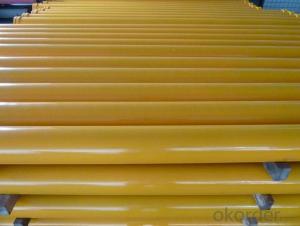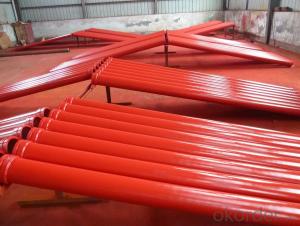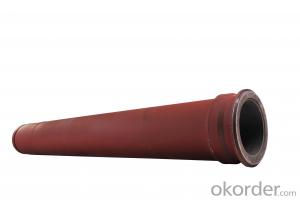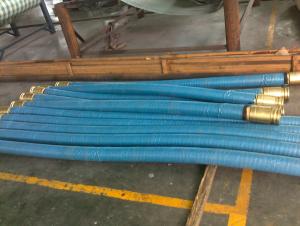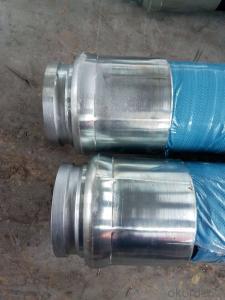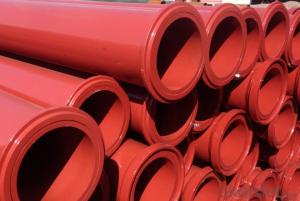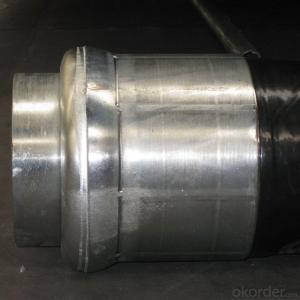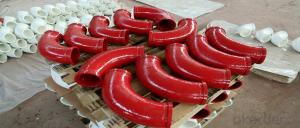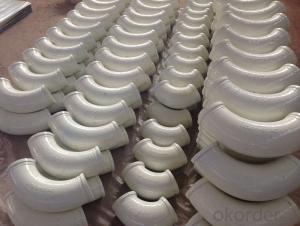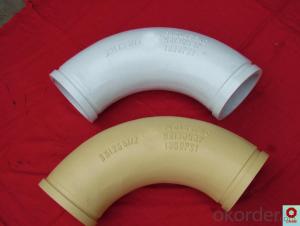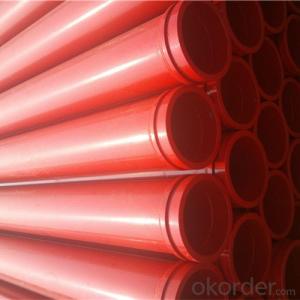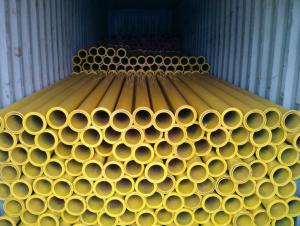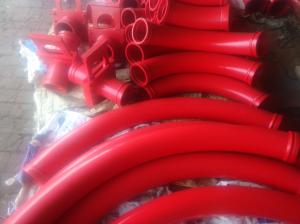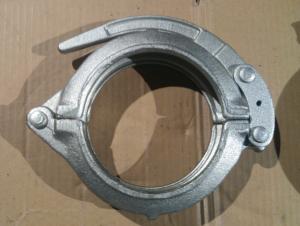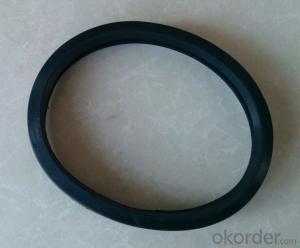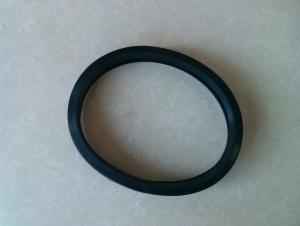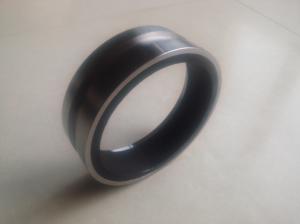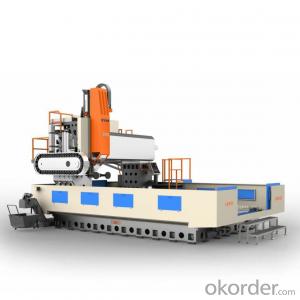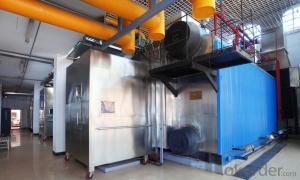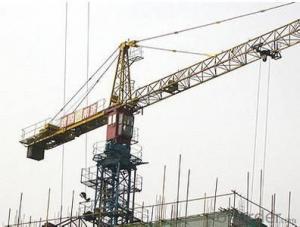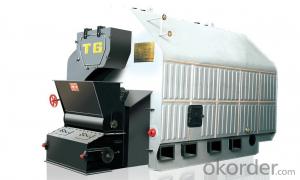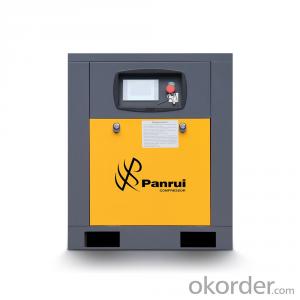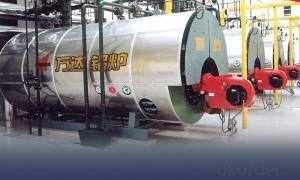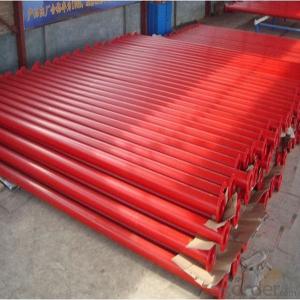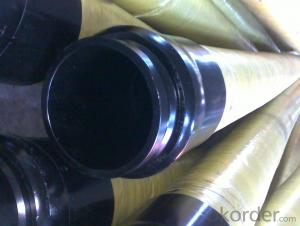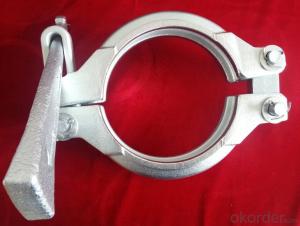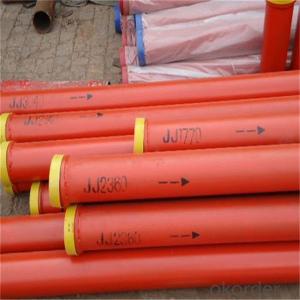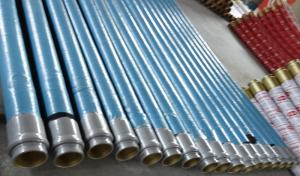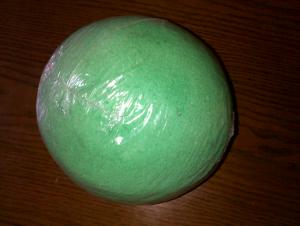Twin Wall Pipe for Concrete Pump Pipe Thickness 7mm Length 1000mm
- Loading Port:
- Tianjin
- Payment Terms:
- TT or LC
- Min Order Qty:
- 50 pc
- Supply Capability:
- 2000 pc/month
OKorder Service Pledge
OKorder Financial Service
You Might Also Like
Product Description:
Product Name: Twin Wall Pipe for Concrete Pump Pipe Thickness 7mm Length 1000mm
Specification
Diameter: DN125
Wall thickness: inner wall is 4 mm 65Mn, outer wall is 3mm seamless steel
Length: 3000&2000&1000mm with wear resistant SK flange
Type: Double / twin wall
Hardness: HRC 63
Using life: 60,000-100,000(CBM)
Highlights: longest using life
Welding: Smooth welding between straight pipes and flanges
Color : as customer's requirement,usually bule or red
Surface: Electrostatic Spraying Epoxy Paint
3. Application
Concrete delivery.
4. Package
Put into containers.
FAQ:
Q1: Why buy Materials & Equipment from OKorder.com?
A1: All products have its ISO certifications, adheres to the highest standards and a commitment to supply chain safety and customer satisfaction.
Q2: How do we guarantee the quality of our products?
A2: We have established an advanced quality management system which conducts strict quality tests at every step, from raw materials to the final product. At the same time, we provide extensive follow-up service assurances as required.
Q3: How soon can we receive the product after purchase?
A3: Within three days of placing an order, we will begin production. The specific shipping date is dependent upon international and government factors, but is typically 10 to 30 workdays.
Q4: If we can produce Twin Wall Pipe for Concrete Pump Pipe Thickness 4.5mm Length 3000mm according to customers request?
A4: Yes, we can produce T Twin Wall Pipe for Concrete Pump Pipe Thickness 4.5mm Length 3000mm according to the difference country situations to make it suitable to the market and customers. We have very professional technical team to make the design.
Q5: How to make a quick resolution for after service?
A5: We have overseas branches all-around of world, If needed, the seller shall dispatch 2 engineers to the buyer's site for supervision of training. The buyer shall make available of necessary facilities &skilled personnel at site for training.
Images:
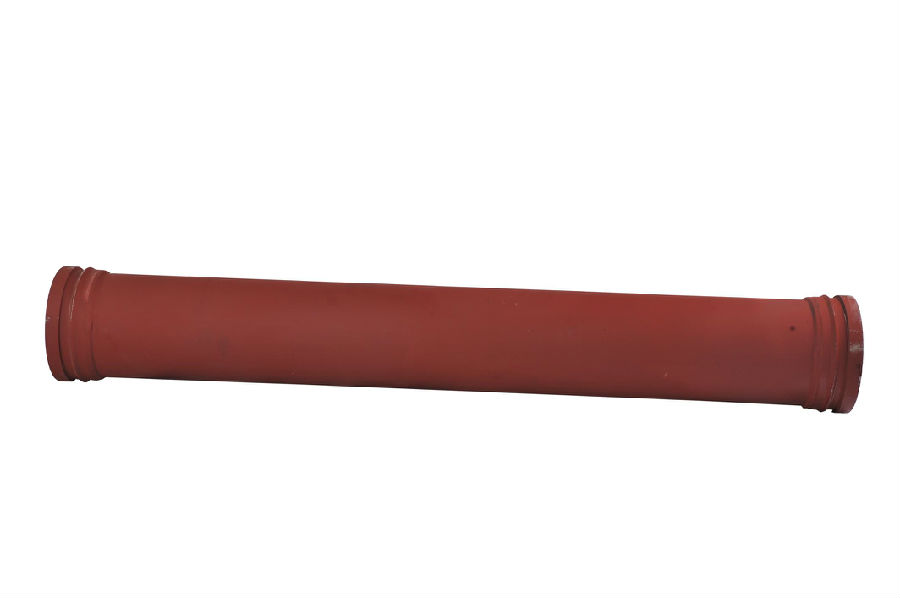
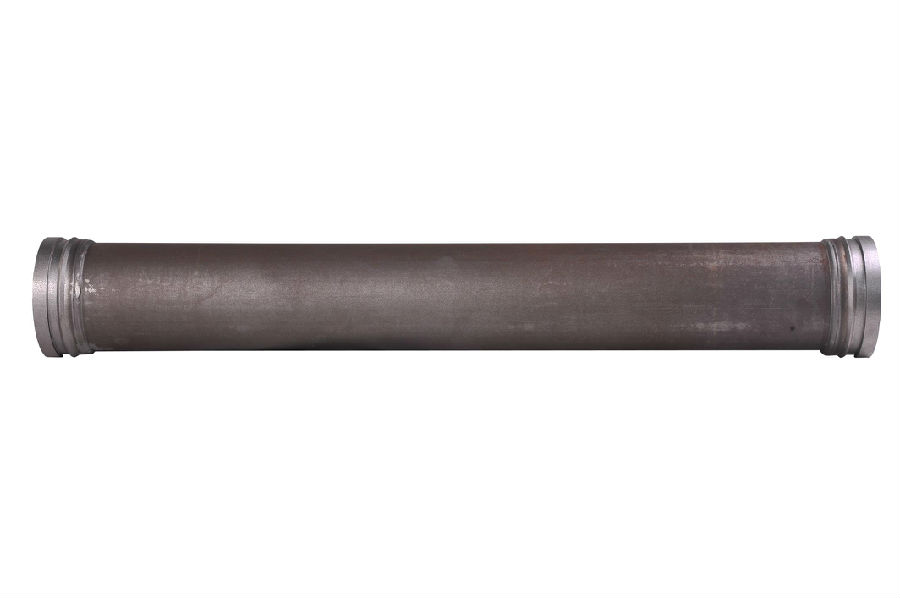
- Q:How often should hopper grate pins be inspected or replaced in a concrete pump?
- Hopper grate pins in a concrete pump should be inspected regularly, ideally before each use, to ensure they are in good condition. Depending on the frequency of usage and the material being pumped, replacement may be needed every few months or as soon as signs of wear and tear are observed.
- Q:What are the indications of an inaccurate concrete pump pressure gauge?
- There are several indications that can suggest an inaccurate concrete pump pressure gauge. Here are a few: 1. Inconsistent readings: If the pressure gauge consistently gives varying readings even when the concrete pumping conditions remain constant, it could be a sign of an inaccurate gauge. For example, if the gauge displays a pressure of 1000 psi one moment and then jumps to 1500 psi without any significant changes in the pumping operation, it could indicate an issue with the gauge. 2. Unusual or abnormal readings: If the pressure gauge consistently displays extremely high or low pressure readings that are significantly different from the expected values, it could signify an inaccurate gauge. It is important to be aware of the typical pressure range for the specific concrete pumping operation to identify abnormal readings. 3. Incongruity with other gauges: If there are multiple pressure gauges installed in the concrete pumping system, and they provide significantly different readings, it could suggest that one or more of the gauges are inaccurate. Comparing the readings of various gauges can help determine if a particular gauge is faulty. 4. Inadequate pump performance: If the concrete pump is not performing as expected, such as experiencing reduced output or inconsistent flow rates, it could be due to inaccurate pressure readings. Inaccurate pressure measurements can affect the control of the pump's hydraulic system, leading to inefficiencies in pumping operations. 5. Physical damage or wear: Any visible damage or signs of wear on the pressure gauge, such as cracked glass, bent needles, or loose connections, can compromise its accuracy. Such physical damage can lead to inaccurate readings and should be addressed promptly. It is important to regularly calibrate and maintain the pressure gauge to ensure accurate readings. If any indications of an inaccurate gauge are observed, it is recommended to consult a professional technician or engineer to assess the situation and take appropriate actions to rectify the issue.
- Q:Can concrete pump spare parts be repaired or refurbished?
- Yes, concrete pump spare parts can be repaired or refurbished. Many common spare parts such as seals, bearings, valves, and hydraulic components can be repaired or refurbished to extend their lifespan and save costs. Repairing or refurbishing these parts can involve replacing worn-out or damaged components, reconditioning or re-machining certain parts, and performing necessary maintenance and testing to ensure their proper functionality. Additionally, some manufacturers or specialized companies may offer services for repairing or refurbishing specific concrete pump spare parts, allowing for a more cost-effective solution compared to purchasing brand new parts. However, it is important to note that not all spare parts can be repaired or refurbished, especially if they are severely damaged or have exceeded their recommended service life. In such cases, it may be more practical and safer to replace the parts with new ones.
- Q:What are the common signs of wear and tear in a concrete pump cylinder?
- Some common signs of wear and tear in a concrete pump cylinder include cracks or fractures on the surface, loss of smoothness or rough texture, leakage of hydraulic fluid, reduced pumping efficiency or pressure, and increased noise or vibration during operation.
- Q:How can a faulty electric motor affect the pump's performance?
- The performance of the pump can be significantly affected by a defective electric motor. To begin with, the motor is responsible for supplying the necessary power to operate the pump. If the motor is faulty, it may fail to generate the required amount of power, leading to a decline in the pump's performance and efficiency. This can result in decreased flow rates and lower pressure output, which in turn hampers the pump's functioning. Furthermore, a defective motor can also give rise to problems such as increased energy consumption and overheating. In case the motor is not working properly, it may consume excessive electrical current, resulting in higher energy usage and elevated operational costs. Moreover, an overheating motor can cause damage to the pump and other associated components, thereby further affecting performance and potentially leading to expensive repairs or replacements. Moreover, the reliability and lifespan of the pump can also be compromised by a defective motor. Operating the pump continuously with a faulty motor can subject it to excessive strain, resulting in premature wear and tear, heightened maintenance requirements, and a shorter lifespan. Consequently, frequent breakdowns, downtime, and a decline in overall productivity may occur. In conclusion, a defective electric motor can have various adverse effects on the pump's performance, including reduced flow rates, diminished pressure output, increased energy consumption, overheating, and decreased reliability. Therefore, it is crucial to regularly inspect and maintain motors to ensure their optimal functioning and prevent any detrimental impact on the pump's performance.
- Q:How often do I need to replace concrete pump spare parts?
- The frequency of replacing concrete pump spare parts largely depends on the usage and maintenance of the pump. However, it is generally recommended to inspect and replace worn-out or damaged parts regularly to ensure optimal performance and prevent any potential breakdowns.
- Q:How often should wear rings be replaced in a concrete pump?
- The replacement frequency of wear rings in a concrete pump relies on various factors such as the pump type, wear ring quality, concrete volume being pumped, and operating conditions. In essence, wear rings are components that endure substantial wear and tear due to the abrasive nature of concrete. Consequently, they will eventually require replacement to uphold the pump's efficiency and avoid potential damage to other pump parts. Typically, wear rings should be regularly inspected during routine maintenance checks. The wear patterns and extent of damage will determine if replacement is needed. In certain cases, wear rings may endure for several thousand hours of operation, while in others, replacement may be necessary more frequently. It is advisable to consult the pump manufacturer for specific guidelines on wear ring replacement intervals based on the pump model and operating conditions. They can offer recommendations based on their expertise and understanding of the pump's design and performance. Ultimately, the objective is to guarantee smooth and efficient operation of the concrete pump, minimizing downtime and maximizing its lifespan. Regular inspections and proactive replacement of wear rings when necessary will contribute to achieving this goal.
- Q:How to choose concrete pump?
- The actual export pressure of concrete pump and the actual product per hour, the greater the value, the greater the capacity index, the power of the motor will be greater, thus achieving the purpose of large displacement, high lift
- Q:How can a faulty concrete pump cylinder affect the pumping process?
- The pumping process can be significantly impacted by a faulty cylinder in the concrete pump. The cylinder's role is crucial in the concrete pumping system as it generates the necessary pressure to push the concrete through the pipes and hoses. A decrease in pumping efficiency is one of the main issues caused by a faulty cylinder. If the cylinder is worn out or damaged, it may not generate sufficient pressure to effectively push the concrete. This can lead to a decrease in the pumping rate and overall productivity of the concrete pumping operation. Moreover, a faulty cylinder can cause irregular and inconsistent flow of concrete. This can result in blockages or clogs in the pipes, disrupting the pumping process. Removing these blockages can be time-consuming and costly, as it may require disassembling the pumping system to access and clear the blocked area. Additionally, leaks can occur in the pumping system due to a faulty cylinder. These leaks not only waste concrete but also reduce the overall pressure in the system, impacting the ability to pump the concrete to the desired location. Furthermore, leaks can create a messy worksite, posing safety risks for workers and potentially damaging surrounding structures. Furthermore, the risk of equipment failure is increased by a faulty cylinder. If the cylinder malfunctions or fails completely, it can cause the entire pumping system to shut down. This can result in significant downtime and delays in the concrete pouring process, leading to additional costs and potential penalties. In conclusion, a faulty concrete pump cylinder can have a significant impact on the pumping process by reducing efficiency, causing irregular flow, promoting leaks, and increasing the risk of equipment failure. To ensure smooth and efficient concrete pumping operations, it is essential to regularly maintain, inspect, and replace the cylinder in a timely manner.
- Q:Can concrete pump spare parts be coated with UV-resistant coatings for outdoor applications?
- Yes, concrete pump spare parts can be coated with UV-resistant coatings for outdoor applications. These coatings provide protection against the harmful effects of ultraviolet rays, preventing damage and extending the lifespan of the parts when exposed to sunlight.
1. Manufacturer Overview |
|
|---|---|
| Location | |
| Year Established | |
| Annual Output Value | |
| Main Markets | |
| Company Certifications | |
2. Manufacturer Certificates |
|
|---|---|
| a) Certification Name | |
| Range | |
| Reference | |
| Validity Period | |
3. Manufacturer Capability |
|
|---|---|
| a)Trade Capacity | |
| Nearest Port | |
| Export Percentage | |
| No.of Employees in Trade Department | |
| Language Spoken: | |
| b)Factory Information | |
| Factory Size: | |
| No. of Production Lines | |
| Contract Manufacturing | |
| Product Price Range | |
Send your message to us
Twin Wall Pipe for Concrete Pump Pipe Thickness 7mm Length 1000mm
- Loading Port:
- Tianjin
- Payment Terms:
- TT or LC
- Min Order Qty:
- 50 pc
- Supply Capability:
- 2000 pc/month
OKorder Service Pledge
OKorder Financial Service
Similar products
New products
Hot products
Hot Searches
Related keywords
